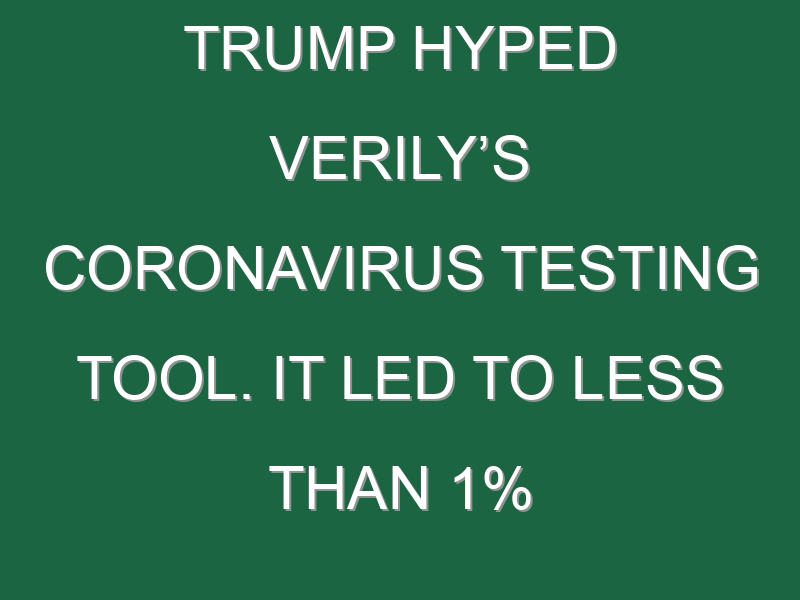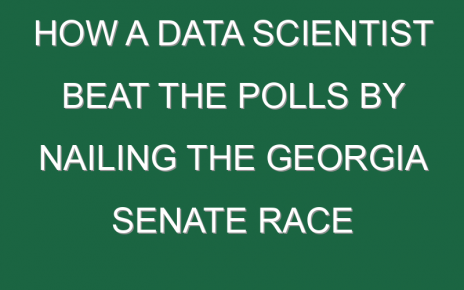Touted by President Donald Trump in March as the company that would connect Americans to coronavirus testing facilities across the country, Alphabet’s life sciences company Verily ended up being far from that. Though the Google corporate sibling did provide testing on a very small scale this year—as it had warned in the wake of the president’s surprise announcement—the coronavirus was never the focus of its larger business strategy.
“The reason we raised our hand for screening and testing is because we thought we had a platform that could be helpful,” said Jessica Mega, Verily’s co-founder and chief medical and scientific officer. But it’s only “part of our work,” and a small part at that.
Verily, which started as one of Google X’s “moonshot” projects, has helped nearly 1.6 million people get tested for the coronavirus at more than 350 sites in 15 states. But that figure represents less than 1% of total tests given in the U.S. this year.
Testing, which has been mostly funded by state and federal governments, isn’t the primary revenue generator for the company, according to Verily, which declined to disclose revenue figures. Instead, Verily makes money from three parts of its business: health innovation for new devices and tools, clinical research, and virtual care for diseases like diabetes. The pandemic, according to Verily, has helped accelerate all three of those businesses.
“We’ve never seen [health data] be as relevant as it is,” Mega said. “In some ways our bets … have only proven out in the pandemic.”
Though most of Verily’s work is not pandemic-related, the company said it intends to continue exploring how it can aid with the coronavirus.
For example, its testing sites will continue as long as they are needed, Mega said. Further, through testing Verily has lured nearly 100,000 people to sign up for its COVID-19 research registry and be contacted for a vaccine trial, two antibody trials, and a proprietary antibody research study. The company has also partnered with Pfizer and the Duke Clinical Research Institution on a study aimed at monitoring healthcare workers who have received the Pfizer-BioNTech vaccine to better understand how different people react to the drug.
Verily also expects a relatively new program it calls Healthy at Work to accelerate as employers bring their workers back to the office. The program, piloted during summer, gives employers access to a symptom tracker for workers, onsite testing capabilities with assistance from trained professionals, and guidance on how often people should be tested in different circumstances. The cost varies depending on the services companies request, Verily said, declining to comment further on the price.
Verily has 19 customers enrolled in Healthy at Work, including Brown University, the University of Alabama at Birmingham, and Alphabet-owned Waymo. “There’s definitely been no pausing since we’ve started,” said Vivian Lee, Verily’s president of health platforms.
The public’s interest in Verily, a company relatively unknown outside of the health and tech industries, surged after President Trump gave a March press conference at which he erroneously said that Google had tasked 1,700 engineers with developing a website “very quickly” to help facilitate testing across the country. The comments caught Verily, the company that was actually doing the work on an exceptionally smaller scale, by surprise.
Though it scrambled to debut its coronavirus screening website and quickly set up its first few testing sites in California, it has spent the last 10 months focusing on small-scale, measured progress as it relates to coronavirus testing.
Even those efforts have come under scrutiny. Some people complained that they needed a Gmail account, the email service provided by Google, to use Verily’s website for screening and testing.
County officials San Francisco and Alameda ended testing with Verily earlier this year, citing privacy concerns that people had to provide sensitive health information using an email account from Google. Verily said those sites were always intended to be short-term testing operations. In response to privacy concerns, Verily has said that it follows all state and federal privacy regulations, including the Health Insurance Portability and Accountability Act, more commonly known as HIPAA. The company also said it doesn’t share information with Google without user consent.
But Verily got another vote of confidence earlier this month after raising $700 million from investors including Silver Lake, Temasek, the Ontario Teacher’s Pension Plan, and parent Alphabet. Verily said it planned to use the funds to expand its work on health data as well as its care and disease management offerings like Healthy at Work.
“We started this company—we’re coming up to five-plus years—with two or three ideas of where we were going to go,” Mega said. “If anything, the pandemic has only given us more conviction around the areas we’ve chosen.”
More must-read tech coverage from Fortune:
- Intuit’s CEO on the $7.1 billion Credit Karma acquisition, reorienting toward A.I., and reskilling workers
- Commentary: The broken business model of Uber and Lyft is taking a heavy toll on society
- WarnerMedia Studios chief on the controversial decision to release new movies on HBO Max
- Look out for these new smartphone features in 2021
- LinkedIn saw a massive influx in user posts and violations this year




